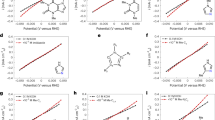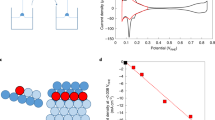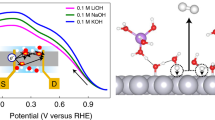Abstract
AT suitably activated palladium cathodes, the diffusion or hydride component of hydrogen Overpotential η2 (or ηd) can be separated conveniently from the total apparent Overpotential, η, by extrapolation of plots against time of changes in the open circuit potential, E, measured after cessation of electrolysis1–3.
This is a preview of subscription content, access via your institution
Access options
Subscribe to this journal
Receive 51 print issues and online access
$199.00 per year
only $3.90 per issue
Buy this article
- Purchase on Springer Link
- Instant access to full article PDF
Prices may be subject to local taxes which are calculated during checkout
Similar content being viewed by others
References
Clamroth, R., and Knorr, C. A., Z. Elektrochem., 57, 399 (1953).
Barton, J. C., and Lewis, F. A., Z. Physik. Chem. Neue Folge, 33, 99 (1962).
Green, J. A. S., and Lewis, F. A., Trans. Faraday Soc., 60, 2234 (1964).
Kandler, L., Knorr, C. A., and Schwitzer, C., Z. Physik. Chem. Lpz., A, 180, 281 (1937).
Fallon, R. J., and Castellan, G. W., J. Phys. Chem., 64, 4 (1960).
Author information
Authors and Affiliations
Rights and permissions
About this article
Cite this article
HULL, M., LEWIS, F. Diffusion or Hydride Component of Hydrogen Overpotential at Platinized Platinum and Palladized Palladium Cathodes. Nature 208, 887–888 (1965). https://doi.org/10.1038/208887a0
Issue Date:
DOI: https://doi.org/10.1038/208887a0
This article is cited by
-
Effect of palladium on hydrogen charging of titanium cathodically polarized in acid media
Soviet Materials Science (1970)
-
Fluctuations of Overpotential during Electrolytic Evolution of Hydrogen
Nature (1967)
Comments
By submitting a comment you agree to abide by our Terms and Community Guidelines. If you find something abusive or that does not comply with our terms or guidelines please flag it as inappropriate.



